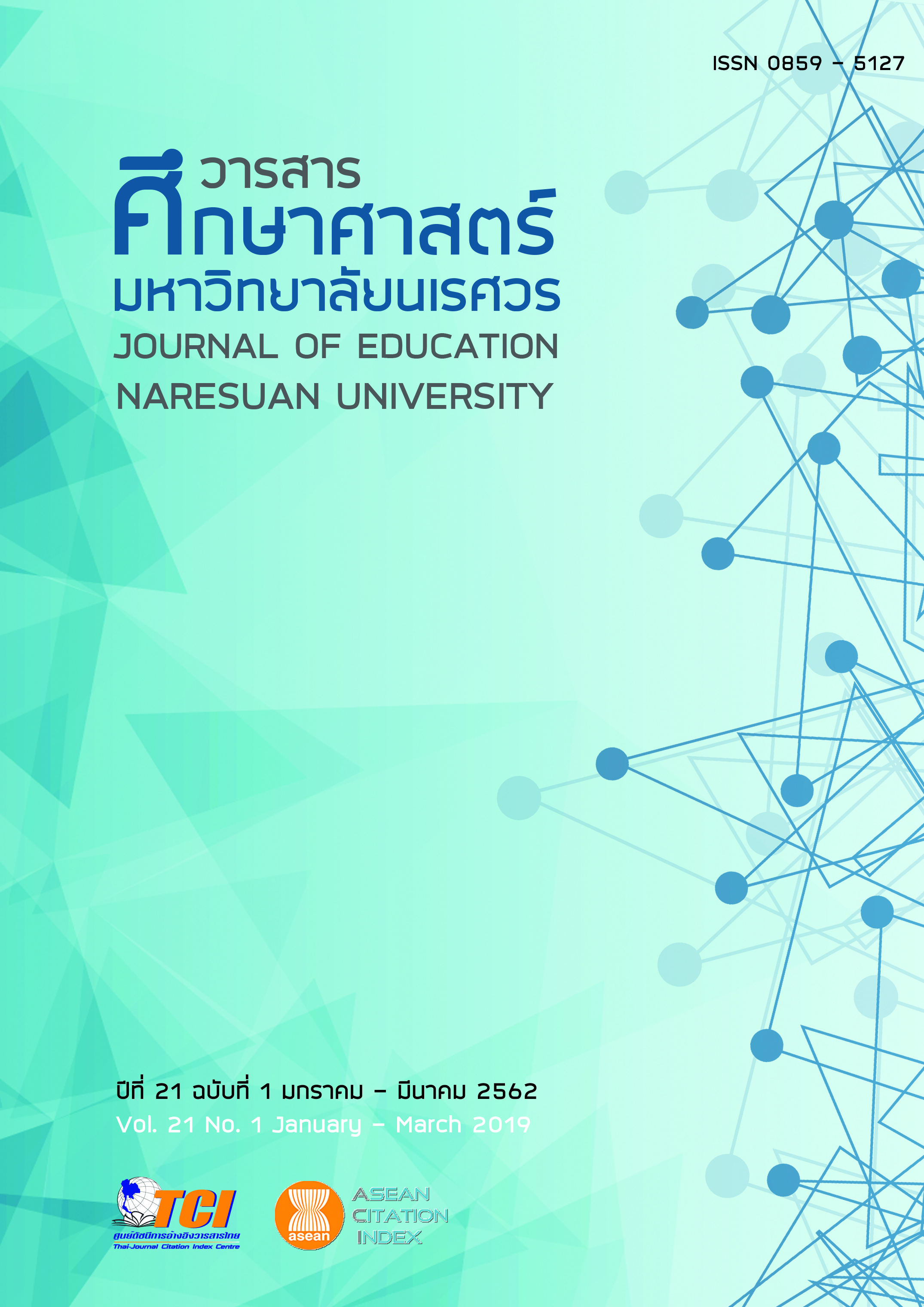รูปแบบการพัฒนาภาวะผู้นำร่วมของคณะกรรมการสถานศึกษาในโรงเรียนระดับมัธยมศึกษา (A MODEL OF COLLECTIVE LEADERSHIP DEVELOPMENT FOR THE SCHOOL COMMITTEE IN SECONDARY EDUCATION LEVEL)
Main Article Content
Abstract
การวิจัยนี้มีวัตถุประสงค์เพื่อเสนอรูปแบบการพัฒนาภาวะผู้นำร่วมของคณะกรรมการสถานศึกษาในโรงเรียนระดับมัธยมศึกษา มีวิธีการวิจัยเป็น 3 ขั้นตอน 1) การสร้างรูปแบบการพัฒนาภาวะผู้นำร่วมของคณะกรรมการสถานศึกษาในโรงเรียนระดับมัธยมศึกษา เป็นการศึกษาองค์ประกอบ และแนวทางในการพัฒนาภาวะผู้นำร่วมจากเอกสารเกี่ยวกับทฤษฎีภาวะผู้นำ และการสัมภาษณ์คณะกรรมการสถานศึกษา 2) การทดลองใช้รูปแบบการพัฒนาภาวะผู้นำร่วมของคณะกรรมการสถานศึกษาในโรงเรียนระดับมัธยมศึกษา 3) การประเมินประสิทธิภาพรูปแบบของกระบวนการพัฒนาภาวะผู้นำร่วมและผลกระทบของการใช้รูปแบบ ผลการวิจัย พบว่า 1) รูปแบบการพัฒนาภาวะผู้นำร่วมของคณะกรรมการสถานศึกษาในโรงเรียนระดับมัธยมศึกษาเป็นแบบจำลองที่แสดงความสัมพันธ์ขององค์ประกอบ 4 ส่วน คือ 1) ทิศทางของรูปแบบการพัฒนา กระบวนการพัฒนา ผลลัพธ์ของรูปแบบการพัฒนา และปัจจัยความสำเร็จของการพัฒนา 2) คณะกรรมการสถานศึกษาและทีมสนับสนุน ได้รับการพัฒนาภาวะผู้นำร่วมโดยการเปลี่ยนแปลงทักษะการเรียนรู้ และการทำงานเป็นทีม 3) ผลการประเมินประสิทธิภาพรูปแบบกระบวนการพัฒนาภาวะผู้นำร่วมของคณะกรรมการสถานศึกษา พบว่าคณะกรรมการสถานศึกษามีการเปลี่ยนแปลงด้านทักษะการเรียนรู้ การทำงานเป็นทีม และการศึกษาผลกระทบของการใช้รูปแบบ พบว่าคณะกรรมการสถานศึกษามีความเข้าใจตนเองและผู้อื่นดีขึ้น คณะกรรมการสถานศึกษาเข้าใจบทบาทและหน้าที่มากขึ้น เห็นคุณค่าของเป้าหมายร่วมในการพัฒนาโรงเรียน
A MODEL OF COLLECTIVE LEADERSHIP DEVELOPMENT FOR THE SCHOOL COMMITTEE IN SECONDARY EDUCATION LEVEL
This research study aimed at proposing a model of collective leadership development for the school committee in secondary schools. The research study followed by three steps: 1) to construct a model of collective leadership development for the school committee in secondary schools. This step was conducted by reviewing related documents and leadership development components and guidelines to develop collective leadership. The study included the interview of a sample of secondary school committee, 2) to experiment the collective leadership practices of the secondary school committee of 2 pilot schools for 2 months, and 3) to evaluate the efficiency and the impacts of the collective leadership model after implementation. The findings of the research were as followed: 1) The model of collective leadership development for secondary school committee illustrated the relationship of 4 components namely, the model direction for development, the development process, the outputs of the model and successful factors of the model, 2) the secondary school committee members and their supporting teams had improved their learning skill and teamwork skill after the experiment, and 3) the efficiency of evaluation of development process of the collective leadership model reflected changes in learning skill and teamwork skill. The impacts evaluation of the model implementation revealed that the committee members earned more self-actualization and had better understanding to others. As the school committee they realized their roles and functions and the core value for goal accomplishment for school development.
Article Details
The owner of the article does not copy or violate any of its copyright. If any copyright infringement occurs or prosecution, in any case, the Editorial Board is not involved in all the rights to the owner of the article to be performed.
References
Contemplative Education Center. (2009). What is contemplative education? Nakornprathom: Mahidol University. [in Thai]
Dokkam, R. (2010). A model for leadership development of school administrators affecting school effectiveness (Master thesis). Sakonnakorn: Sakonnakorn Rajabhat Institute. [in Thai]
Griffiths, S., & O’Neill, C. (2012). Packet on Collective Leadership. Retrieved September 5, 2015, from https://www.wholonomyconsulting.com/docs/ Collective_Leadership_March2012.pdf
Kellogg. (2007). The collective leadership framework a workbook for cultivating and sustaining community change. From https://www.ethicalleadership.org/uploads/2/6/2/6/26265761/Collective_leadership_framework_workbook.pdf
Ketkeaw. K., Kornpuang, A., Chatruprachewin, C., & Prachanban, P. (2013). A model to improve the operational competency of the committee of basic education small - sized schools. Journal of Education Naresuan University, 15(special), 20-33. [in Thai]
Leithwood, K., & Mascall, B. (2008). Collective leadership effects on student achievement. Retrieved July 12, 2015, from https://eaq.sagepub.com/content/44/4/529
Montfort College. (2011). Administration participation of the college basic education school committee primary section B.E. 2554. Chiangmai: Montfort College Primary Section. [in Thai]
Nilchai, T., & Chansuk, A. (2003). Education process for change: Contemplative education manual. Nakornprathom: S P N. [in Thai]
Nillpun, M, Jongwutiwes, K, & Kitroongrueng, P. (2007). The Study of Learning and Development Guidelines for Educational Management of Basic Education Committee. Bangkok: Silpakorn University. [in Thai]
Nuchnuang, A., Kinawong, N., Meejang, S., & Jansila, V. (2008). Participative administration model for school development of the basic education school committee. Journal of Education Naresuan University, 10(special), 1-16. [in Thai]
Sanrattana, W. (2012). Concept, theory, and point for education administration (8th ed.) Bangkok: Thipwisuth. [in Thai]
Siriwongsawat, K. (2007). The relationship between the administrators’ leadership and the participation of basic education schools committee under the Office of Samutsakhon Education Service Area (Master thesis). Bangkok: Silpakorn University. [in Thai]
Tulsuk, P. (2005). The development of model and operational efficiency of the schools in Thailand (Doctoral dissertation). Phitsanulok: Naresuan University. [in Thai]


